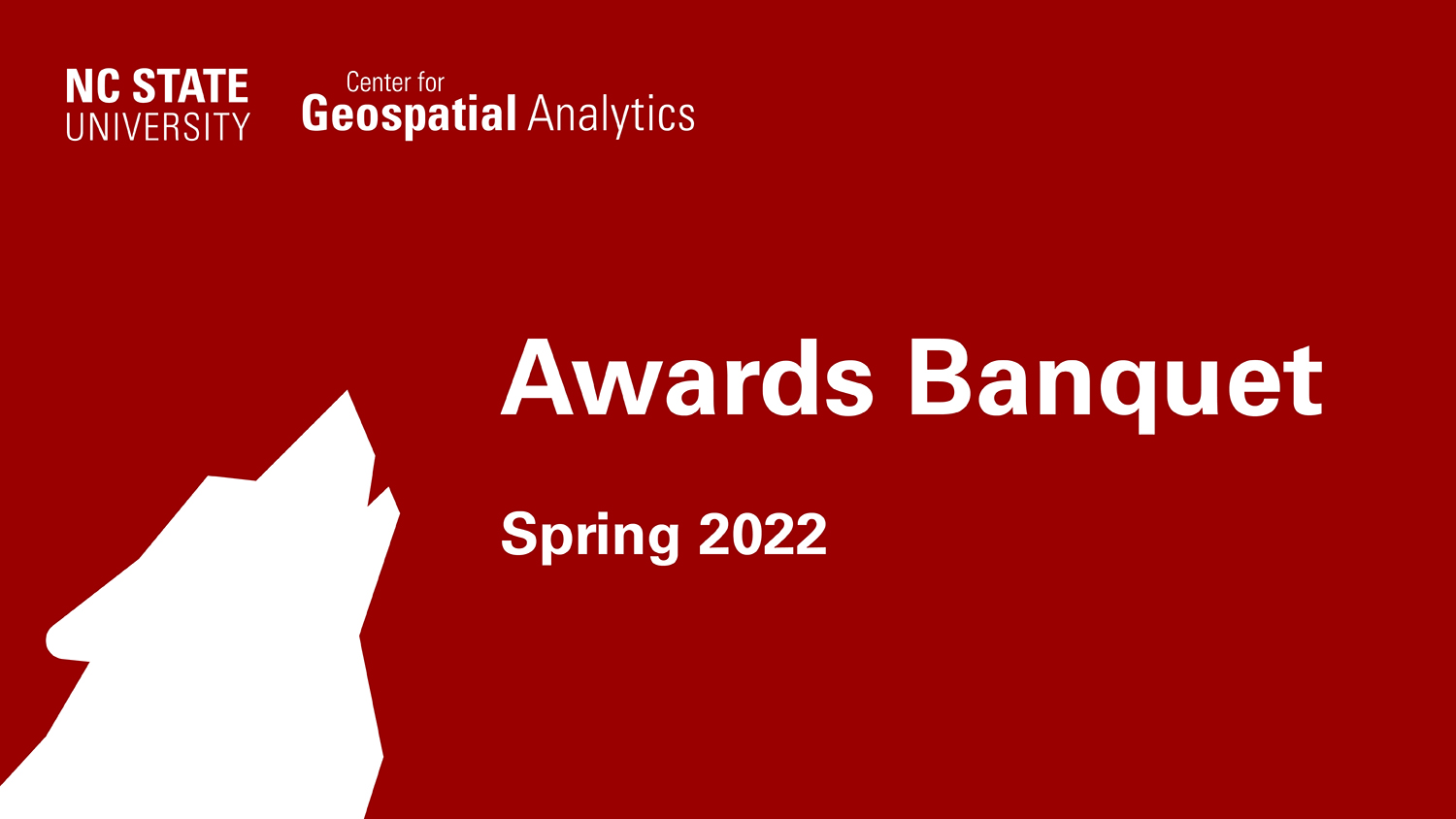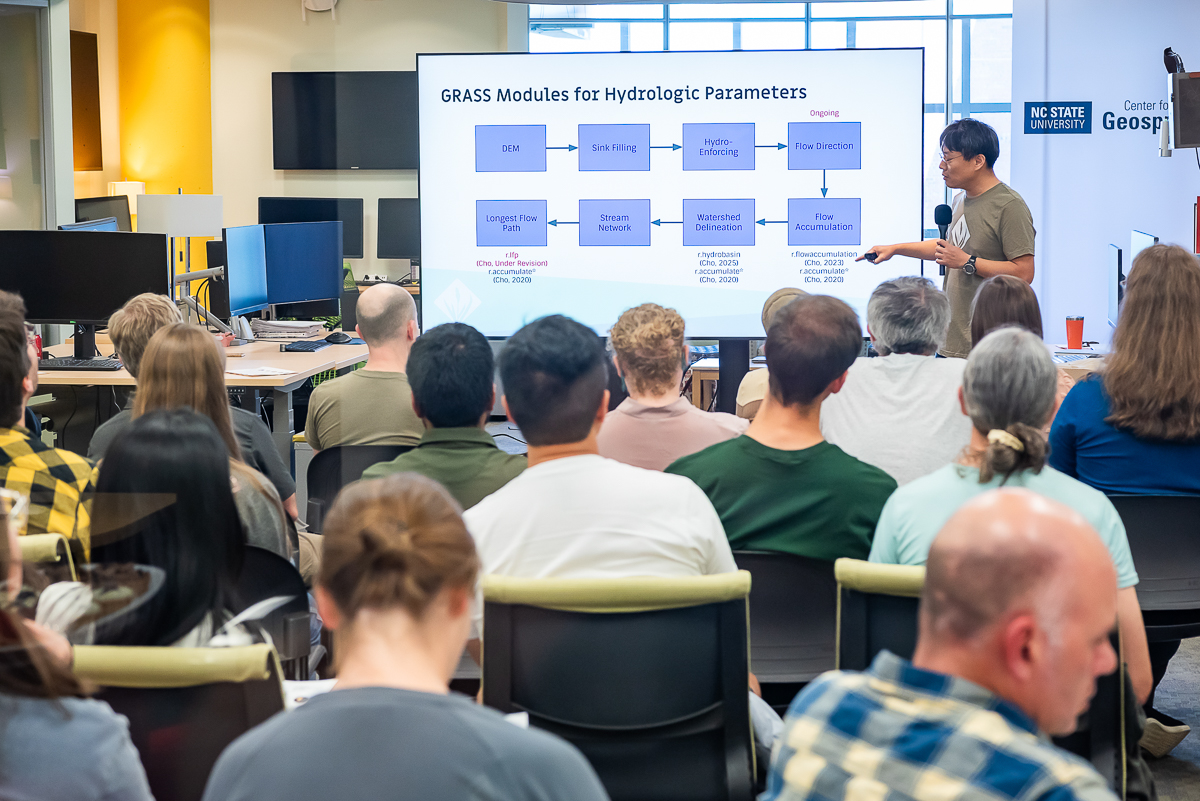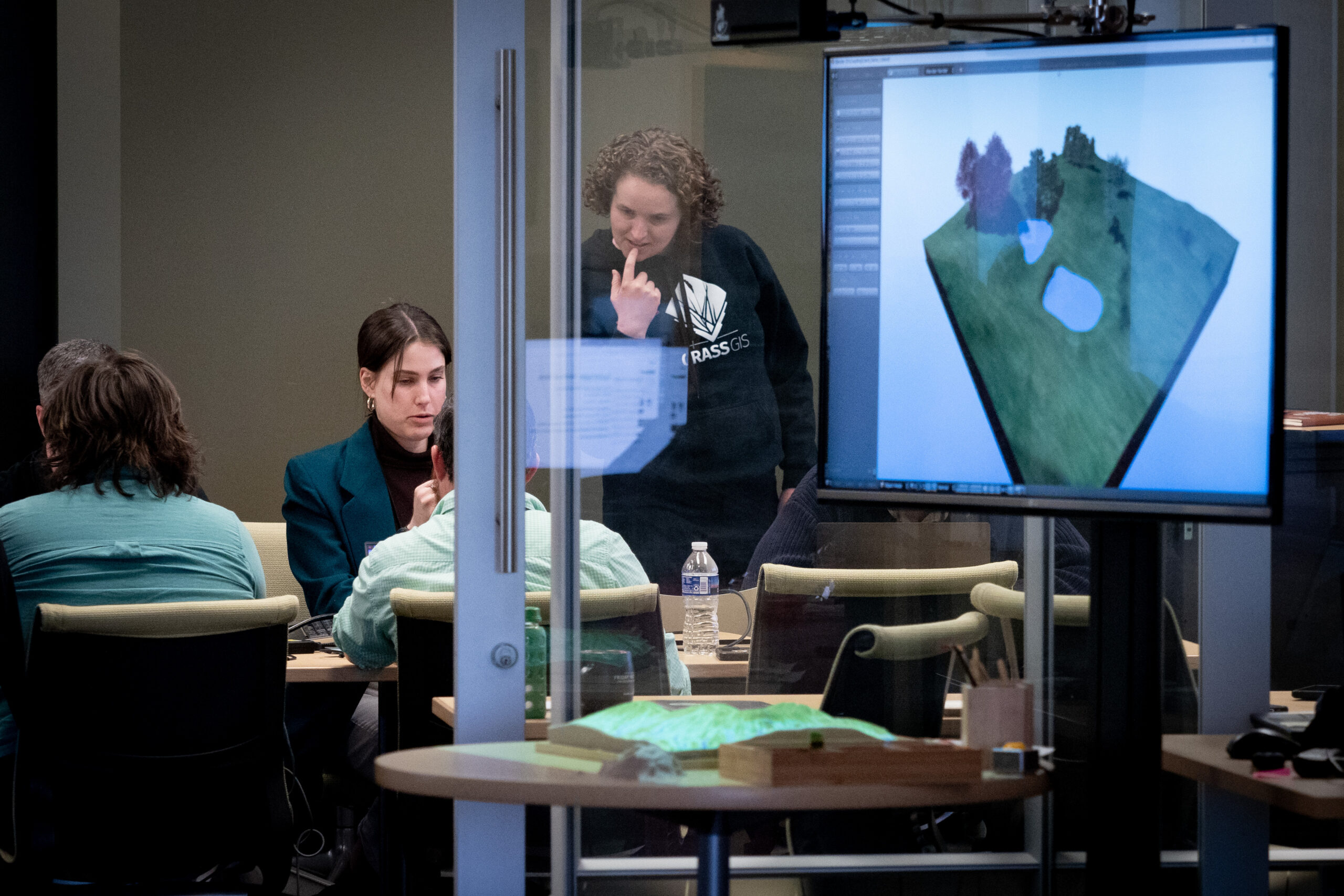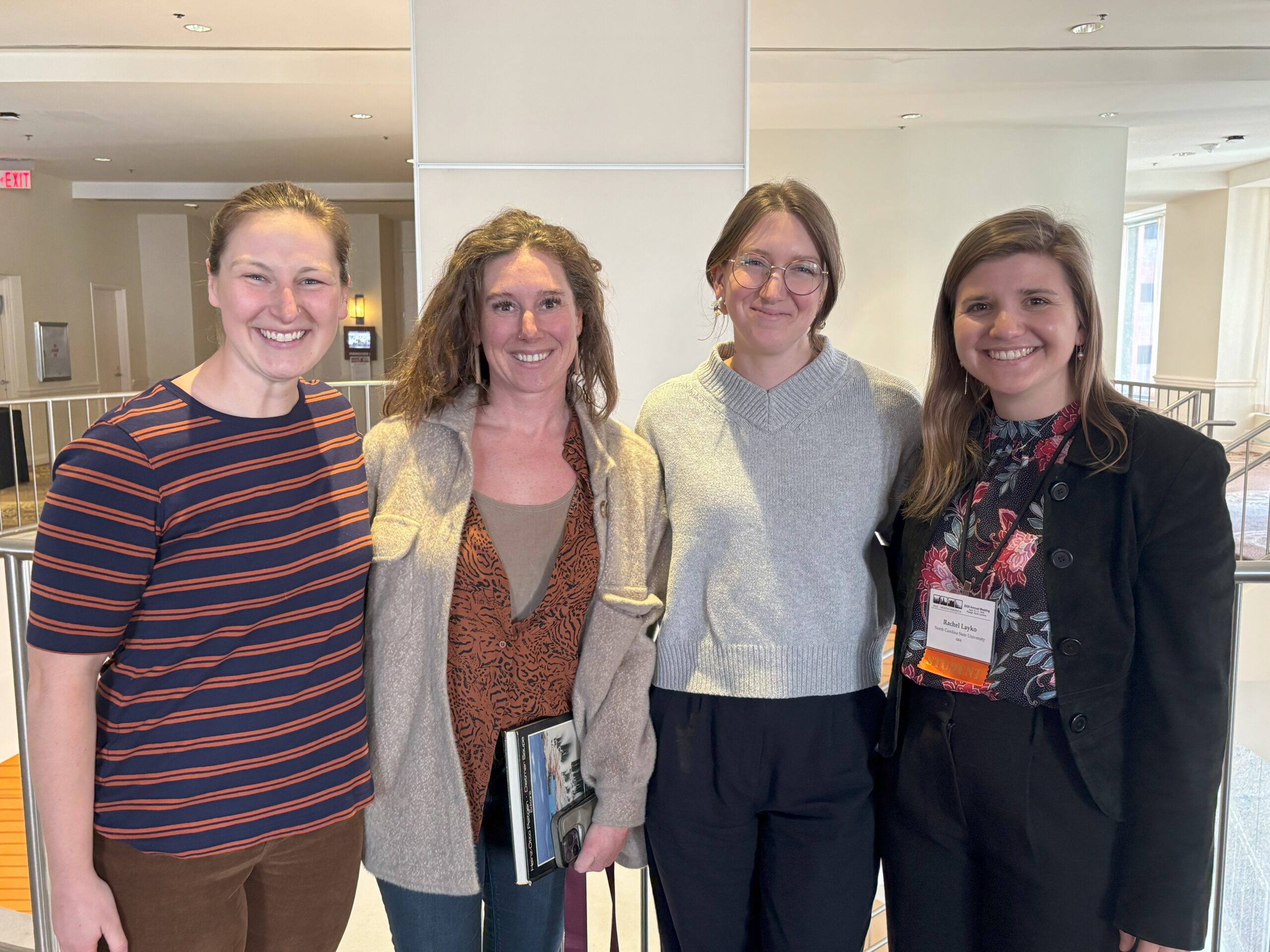Celebrating Our Community: Third Annual CGA Awards

On March 31, the Center for Geospatial Analytics celebrated its third Awards Ceremony, honoring 2021 achievements by our exceptional students, faculty and staff.
At the awards banquet held at the JC Raulston Arboretum, the third round of CGA Awards were presented. These awards, established in 2019, honor members of the Center for Geospatial Analytics community whose efforts exemplify Center ideals of collaboration, inclusion and excellence in research, teaching and service. Center students and faculty/staff were nominated by other Center members for the awards, and winners were selected by the Awards Committee.
Advocate Award
Given to one student and one faculty/staff member who demonstrates a commitment to equity and inclusion.
- Student awardee: Alex Yoshizumi, a third-year Geospatial Analytics Ph.D. student. Alex is co-president of our Geospatial Graduate Student Organization. He received several nominations, touting his leadership and support of the Race & Place Seminar Series and GIS Week, including organizing the W.E.B. Du Bois Visualization Exhibit to promote scholarship around racial equity and justice. Alex has created a wage transparency tool for our Ph.D. students and also serves on the College of Natural Resources’ Graduate Student DEI Committee.
- Staff awardee: Eric Money, the Center’s Associate Director of Professional Education. As Director of the MGIST program, Eric is a passionate advocate for inclusion of online and nontraditional students. He consistently works to make sure the Center’s activities and operations are inclusive and accessible for students who are not taking courses on campus or who work full-time. Currently, Eric is working to increase teaching assistant stipends and to create scholarships for MGIST students, who are not usually eligible for other funding. Eric serves on the College of Natural Resources Diversity Committee and is also knowledgeable about the unique needs of military-affiliated students.
Beacon Award
Given to one student, one faculty/staff member and one alum who shines a light on the Center for Geospatial Analytics in the wider scientific community.
- Student awardee: Elyssa Collins, a third-year Geospatial Analytics Ph.D. student. Elyssa’s first-author publication in Environmental Research Letters, “Predicting flood damage probability across the conterminous United States,” and the associated data release have received a great deal of press coverage. She has been interviewed by The News & Observer and several other outlets. She will also be participating in an internship at NASA this summer to advance open science in hydrology.
- Staff awardee: Georgina Sanchez. Georgina is a Research Associate at the Center and works hard to create partnerships across the university as well as through external organizations. Her research on urbanization and flooding is extremely important to the wider scientific community and the general public. Georgina also mentors both graduate and undergraduate students, serving as a great role model for the future of geospatial data science.
- Alum awardee: Chelsey Walden-Schreiner. Chelsey recently joined the Patrick J. McGovern Foundation in San Francisco, California, where she will draw on her experiences as both a Ph.D. student and Research Scholar at our Center to help “advance AI and data solutions to create a thriving, equitable, and sustainable future for all.” She exemplifies the talented Center community who are dedicated to an equitable and sustainable future.
Collaboration & Innovation Award
Given to a research team who collaborates across disciplinary boundaries to address environmental and societal challenges.
- Team awardee: the MUTATED team, led by Faculty Fellow Josh Gray, with Laura Wendelberger (a fifth-year Ph.D. student in the Department of Statistics), and Jenna Abrahamson and Owen Smith (two first-year Geospatial Analytics Ph.D. students). According to their nomination: “The team uses their knowledge and complementary strengths to develop efficient, automated change-detection algorithms using time series of expansive regions of remotely sensed images. From an outside perspective, Laura seemingly learned remote sensing terminology and methods overnight, and Jenna and Owen got up to speed on Bayesian statistics in record time. Their remarkable progress is a clear indication of their dedication and teamwork. Their progress would not be possible without Josh, who always offers his guidance, support, time, resources and brainpower. They are a dream team.”
Creativity in Teaching Award
Given to one student and one faculty/staff member who creates an innovative learning environment that engages diverse learners in the study of geospatial data science.
- Student awardee: Caitlin Haedrich, a second-year Geospatial Analytics Ph.D. student. Caitlin received multiple nominations. This year, she has served as a teaching assistant for two of our Ph.D. core courses. According to one of the nominations: “In Geospatial Computation and Simulations (GIS714), she has developed creative and accessible ways to introduce technical concepts such as Git, teach skills including how to run GRASS GIS in Jupyter notebooks, and develop meaningful assignments. She has fostered meaningful discussions and helped students formulate their thoughts into clear, compelling, and critical blog posts and proposals in Geospatial Analytics for Grand Challenges (GIS 710). I’m glad the first-year students had her as a source of support throughout their first year!”
- Faculty awardee: Faculty Fellow Perver Baran. Perver has been an integral part of the Center for more than 20 years! She continues to apply design thinking principles and adopt new technologies to support student learning in the distance education environment. For example, she uses Google Sites to organize her group projects in GIS 520, which facilitates peer interaction that can be hard to accommodate in asynchronous courses. Using Google Sites, students can easily evaluate project efforts, review other students’ critiques, and add meaningful feedback to build a holistic dialog about a project.
Interdisciplinary Advancement Award
Gven to one student not enrolled in a Center degree program who applies principles of geospatial analysis to address grand challenges requiring an interdisciplinary approach.
- Awardee: Laura Wendelberger, a Ph.D. student in Statistics. Laura was nominated by her fellow students in Josh Gray’s lab group, who wrote: “As our resident ‘stats guru,’ she supports the rest of the lab members by answering statistical questions, reviewing models and ensuring that our methods are statistically sound. Outside of work, she has become a very valuable member of the lab. She began studying statistics because it can be applied to practically anything, but she seems to have found her niche in geospatial analytics. After graduating in Spring 2022 and completing a post doc position at Lawrence Livermore National Laboratory, she is strongly considering pursuing a position as a statistician in the remote sensing field. She wishes she found geospatial analytics sooner, and we wish we had found her sooner.”
Gladys West Award
Gladys West was one of science’s “hidden figures,” her contributions to GPS technology going unrecognized for decades. At the Center, we have many hidden figures who serve as role models and consistently exceed expectations but are not often recognized.
- Student awardee: Bill Herzig, an online MGIST student. According to his nomination, “Bill Herzig always asks the questions in the forum that everyone else is wondering, follows up on professor/TA responses to make sure they are as meaningful as possible, and often answers other students’ questions before the professor can (as appropriate). He helps make the courses and the MGIST program better for the students and professors alike.”
- Staff awardee: Zac Arcaro, the Center’s Assistant Director of Operations. Zac received multiple nominations for this award (and in fact has been nominated every year). One nominator wrote: “Zac works tirelessly to support CGA on a day-to-day basis and ensures everything runs smoothly. Zac multitasks on many things, including administrative matters, remodeling CGA facilities and offices, assigning offices and computers to new graduate students, guiding the CGA Service Center, supervising Service Center staff and more. CGA is running smoothly because of his hard work.” Another stated simply that “Zac is the Center. He is the FAQ, troubleshooter, and IT. CGA runs because of Zac!”


